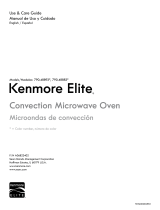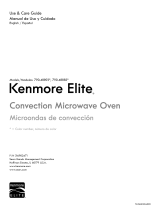
9
E
Getting Started
BEFORE USING MICROWAVE OVEN
NEVER use the oven without the turntable and support nor turn the
turntable over so that a large dish could be placed in the oven. The
turntable will turn both clockwise and counterclockwise.
ALWAYS have food in the oven when it is on to absorb the microwave
energy.
When using the oven at power levels below 100%, you may hear the
magnetron cycling on and off. It is normal for the exterior of the oven
to be warm to the touch when cooking or reheating.
Condensation is a normal part of microwave cooking. Room humidity
and the moisture in food will influence the amount of moisture that
condenses in the oven. Generally, covered foods will not cause as much
condensation as uncovered ones. Ventilation openings must not be
blocked.
The oven is for food preparation only. It should not be used to dry
clothes or newspapers.
Your oven is rated 1100 watts by using the IEC Test Procedure. In using
recipes or package directions check food a minute or two before the
minimum time and add time accordingly.
Cookware Safety
• Use dry, sturdy pot-holders. Damp pot-holders may cause burns
from steam. Dishtowels or other substitutes should NEVER be used
as potholders because they can trail across hot surface elements
and ignite or get caught on appliance parts.
• DO NOT heat unopened food containers; buildup of pressure may
cause the container to explode and result in injury.
• Use care when opening the microwave door. Let hot air or steam
escape before removing or replacing food.
• PREPARED FOOD WARNING: Follow food manufacturer's
instructions. If a plastic frozen food container and/or its cover
distorts, warps, or is otherwise damaged during cooking,
immediately discard the food and its container. The food could be
contaminated.
It is not necessary to buy all new cookware. Many pieces already in your
kitchen can be used successfully in your new Microwave Oven. Make
sure the utensil does not touch the interior walls during cooking.
Use these utensils for safe microwave cooking and reheating:
• glass ceramic (Pyroceram
®
), such as Corningware
®
.
• heat-resistant glass (Pyrex
®
)
IMPORTANT–Please Read and Follow





















